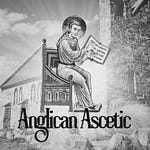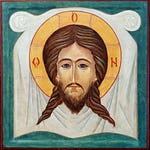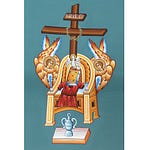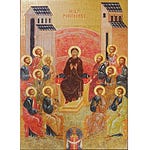There is an axiom in the Church about the Saints. And that axiom is: the Saints are always to be admired, and when possible, imitated. This applies to all Saints, whether those of the New Testament, the apostolic era, and up to today. And so that includes S. John the Baptist. His importance is non-debatable, because all four Evangelists describe his role in God’s plan of salvation through Jesus Christ. Yet imitating John seems difficult, for a number of reasons. He lived two thousand years ago, in a different culture, in a different society, spoke a different language, and so forth. And that he ate different things, for goodness sake. Locusts and wild honey! Wild honey, ok, maybe, I think (except for perhaps all the bees). But locusts, or eating any bug, is a bridge too far. Also, I mean, his clothes are a little (what shall we say?) . . . austere: the leather belt around his waist sounds dapper enough, but being clothed with camel’s hair? Like, everywhere camel’s hair? And then, look at this family. Not only was John a Saint, but John had a Saint for his mother, a Saint for his father, the Queen of Heaven for his “auntie,” and the Eternal Word of the Father as a “cousin.” Not easy to relate with John the Baptist based on his diet, clothing, and family relations!
Let me say that the diet is not what it seems to be. Scripture shows this. In Ezekiel chapter 3, the prophet Ezekiel hears Christ speak to him. He hears Him say: “‘Eat what is offered to you; eat this scroll, and go, speak to the house of Israel.’ So I opened my mouth, and he gave me the scroll to eat. And he said to me, ‘Son of man, eat this scroll that I give you and fill your stomach with it.’ Then I ate it; and it was in my mouth as sweet as honey.” So when we are told that John the Baptist eats honey, it is a reference made by the Evangelists to Ezekiel, and this reference serves to describe John the Baptist as a student of Scripture, even one that tastes the sweetness of Scripture, which means a profound reading of Scripture where the Holy Spirit reveals truths hidden from all eternity. And as far as the locusts, we look at the Book of Exodus, the 10th chapter, which reads “Lord said to Moses, ‘Stretch out your hand over the land of Egypt for the locusts, that they may come upon the land of Egypt.’ The locusts, along with all of the plagues, represent God’s judgment upon Pharaoh which is announced by Moses, even prepare Pharaoh for God’s judgment which God will accomplish in the Red Sea. And so here, because John the Baptist is described as eating locusts, this is to tell us that he understands God’s judgment, and has experienced it so as to be able to proclaim about it to others. Like Moses, John has received power to proclaim God’s coming judgment, which is exactly what it means to bear the witness that John bears as the voice of one crying in the wilderness: “Prepare the way of the Lord, make His paths straight.”
Yet with that said, is it even possible to imitate John, at all? And to that I say, yes, it is, if one understands how. And that understanding is found by remembering that Saint John the Evangelist, in his Gospel account, tells us that that there was a man sent from God, who came for testimony, to bear witness to the light, that through Him people might believe in the Light – the Light who is Christ. John is that man, sent to bear witness to the Light that people believe in the light. Despite being so different from John, in this way we are exactly like him; his mission is our mission, and ours is like his. We are to bear witness to the Light who is Christ. Indeed we are to imitate John in this work.
And there is another way. And here we must realize that John almost certainly had known about Jesus all his life, hearing we can assume from his mother Elizabeth, and even from Mary herself, about the message Gabriel brought Mary, that Christ is the Savior spoken of in Scripture. And are we not like John in this way, also? Most if not all of us are like this: we have grown up knowing parts of the story of Jesus, even those parts. For many of us, there is not a time we remember when we did not know at least a little bit about Christ. John is living with the knowledge of Jesus, as we live with knowledge of Jesus. John understood Jesus to be the Lamb of God who takes away the sins of the world, as we do. Yet as this is the case for John and for us, at the same time, there is so much of Christ yet to be revealed to him and us. For example, what about the Second Coming? Or even, what happens after we die? On these important matters, John knew nothing more than we do. The Coming of Christ is full glory to judge the quick and the dead, and to judge us, was as much a mysterious doctrine to him as it is for us. And the same with the doctrine of Christian death. We walk in hope, in trust, in faith: John walked in hope, in trust in faith. Christ, the Lamb of God, walked among him, and Christ the Lamb of God walks among us, and feeds us.
So to imitate John the Baptist, ultimately, is to realize the immense power of Jesus Christ, and that His immense power is wrapped in mystery and expectation. If Advent emphasizes having an attitude of watching, and an attitude of recognizing Christ as the Coming One, John the Baptist shows a person who watches and waits from the Coming One. John embodies the attitude of Advent, embodies Advent itself, and not only in what John thinks but what he says. And this attitude we can have, and do have. That although we do not know precisely what is coming when Jesus returns to judge the living and the dead, and even when we are judged, or what happens after we did; what we know now is what John proclaimed: make straight the way of the Lord, and do so now. We can actually say that with John the Baptist, and understand it in much the same way, even the exact way, he did. To make straight the way of the Lord is to seek God’s grace, grace which delivers us from our sins, grace which purify us from our iniquities. So that when Christ shall come again in power and great triumph to judge the world, He may find a room in us prepared for Him, and that we may without shame or fear rejoice to behold His appearing. Amen.











Share this post